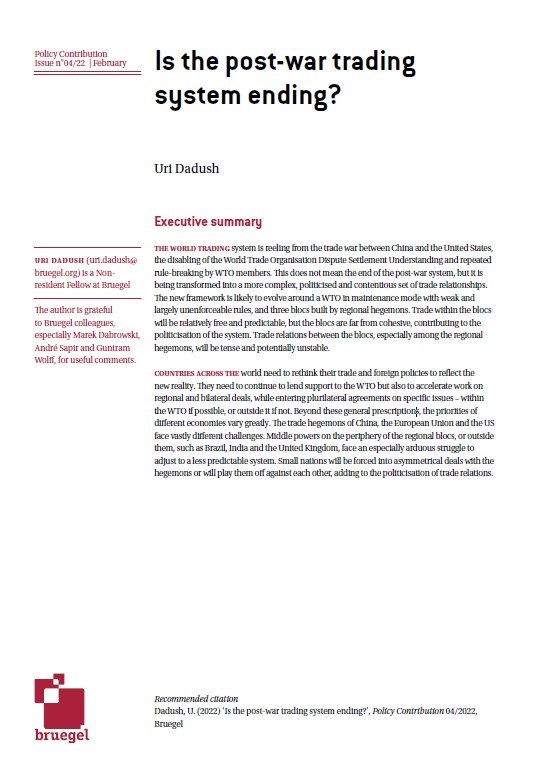Blog Post
The consequences of Switzerland’s lost equivalence status
Due to a spat between the European Commission and the government of Switzerland over the negotiation of an institutional framework agreement, equity securities that are listed on Swiss exchanges are banned from being traded on stock exchanges in the European Union. This blog post reviews the background of this incident and assesses the consequences for companies listed in Switzerland as well as EU investors investing in Swiss equity securities.
Relations between Switzerland and the European Union are governed by a collection of roughly 120 bilateral agreements. In 2014 the two parties started negotiating an institutional framework agreement which would govern the interpretation and application of these agreements in practice and regulate the adaptation of the agreements to new circumstances if necessary. By the end of last year, the Swiss Federal Council, the executive branch of the Swiss federal government, and the European Commission came up with a draft agreement.
To get ratified in Switzerland, the agreement will most likely have to be submitted to a popular vote. To ensure broad public support, the Swiss government decided in January to publish the draft agreement for consultation with national stakeholders. In June, in a letter to the European Commission President Juncker, the Swiss Federal Council wrote that these consultations showed a need for further clarifications and assurances, particularly on the three aspects of state subsidies, wage protection and the EU citizens’ right for free movement.
In his response, Mr Juncker agreed to provide clarifications but ruled out any renegotiations and urged swift ratification of the agreement before the end of his Commission Presidency in October. However, following this exchange, the Swiss Parliament instructed the Federal Council to pursue additional negotiations or to take other appropriate measures to improve the draft agreement with respect to the three aspects mentioned in the Federal Council’s letter.
Frustrated with what it perceives as a lack of commitment from Switzerland, the European Commission decided to not renew the “recognition of equivalence” of Switzerland’s financial market rules as of July 1st. Since January 2018, the EU Markets in Financial Instruments Directive and Regulation (MiFID II and MiFIR) restrict EU investment firms’ choice of trading venues. Specifically, stocks that are traded in the European Union cannot be traded on stock exchanges of third-countries that are not recognized as having prudential and business conduct requirements which are equivalent to the ones in the EU. In 2017 when the Commission had to grant equivalence status to a range of important financial partner countries, the equivalence decision for Switzerland was limited to one year with an extension made contingent on “progress made towards the signature of an agreement establishing that common institutional framework”.
As the shares of the largest Swiss stock companies are traded both in Switzerland and on European exchanges, the ceasing of Switzerland’s equivalence status would effectively have banned EU investment firms from trading these shares on the Swiss stock exchanges. As a result, participation of European investors on the Swiss stock exchange could have collapsed. To prevent this from happening, the Swiss government prohibited shares of Swiss companies which are listed or traded on a Swiss stock exchange from being traded on EU exchanges. Now that they are no longer traded on exchanges in the European Union, the restriction under MiFIR no longer applies to Swiss equities which means that EU investment firms are released from the requirement to trade them on EU trading venues. The final result of these legal manoeuvres is that since July 1st, shares of companies listed on the Swiss stock exchange are no longer traded on EU exchanges and EU investors are instead buying and selling these shares through providers on the Swiss stock exchange or on other trading venues outside of the EU.[1]
Figure 1: Prices and volumes of Swiss Market Index and Euronext 100 Index (6-month average = 100)
Source: Bruegel based on Bloomberg.
In the short run these new circumstances had not too much of an effect on Swiss equity markets. A newspaper reported on July 1st that market participants expected hardly any impact on trading in Swiss equities. Figure 1 shows the prices of the Swiss Market Index (SMI), Switzerland’s blue-chip stock market index, and Euronext 100, a blue-chip index of the Euronext exchange. Prices are normalized to 100 being the average daily closing price of each index in the first half of 2019 (January to June). The figure shows that the SMI moved largely parallel to the Euronext index since the first of July. The trading volume of the SMI has increased since the beginning of July and has been rather volatile compared to the Euronext 100 Index (figure 1) but not out of the range of what has been observed over the last 3 months.
Figure 2 shows that the overall volume of traded shares on the SIX Swiss Exchange has remained within the range of earlier months and moved close to the trends observed on the Euronext exchanges in Amsterdam and Paris. In conclusion, for the time being, the loss of equivalence has left Swiss equities and the Swiss stock exchange not worse nor better off.
Figure 2: Trade volumes on SIX Exchange in Zurich and Euronext in Amsterdam and Paris (6-month average = 100)
Source: Bruegel based on Bloomberg.
[1] Shares that are cross-listed in Switzerland and in the EU continue to be tradable on Swiss and EU trading venues.
Republishing and referencing
Bruegel considers itself a public good and takes no institutional standpoint. Anyone is free to republish and/or quote this post without prior consent. Please provide a full reference, clearly stating Bruegel and the relevant author as the source, and include a prominent hyperlink to the original post.











